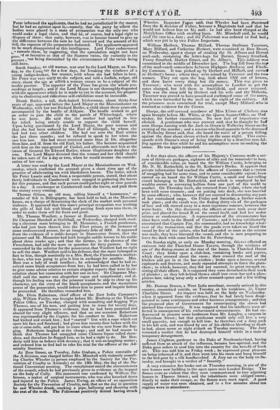A few days since, the officers of his Majesty's Customs
wide a sei- zure of thirty-six packages, eighteen of silks and the remainder in lace, of considerable value, on board the Sir William Curtis, belonging to Mr. N. M. Rothschild, in the St. Katherine's Docks. It appeare that private information had reached the officers of Customs that a system of smuggling had for some time, and to some considerable extent- been carried on on board the Sir William Curtis, a small and fast-saiiing vessel belonging to Mr. Rothschild, and which is employed by her wealthy owner in conveying bullion from one part of the world: to another. On Thursday week, she returned from Calais, where she had been with some treasure ; and on putting into dock, she was boarded by some officers ; who, however did not succeed in discovering any part of her contraband cargo. On Friday and Saturday, a further search took place ; and the result was, the finding thirty-six of the packages of lace and silk stowed away in a most ingenious manner, between the water-butts. On this discovery, the officers at once took away their prize, and placed-the broad R on the vessel itself, and had her under seizure or condemnation. A representation of the circumstance has since been made to the Board of Customs ; and it being satisfactorily ascertained that Captain Pay, the commander, had no knowledge what- ever of the transaction, and that the goods were taken on board the vessel by five of the sailors, who had absconded as soon as the seizure was made, they have liberated the vessel, and she is now preparing to leave the dock with some bullion for St. Petersburg.
On Sunday night, or early on Monday morning, thieves effected an entrance into the Thatched House Tavern, through the windows of one of the dining-rooms at the rear of the house, in Thatched House Court : they broke open a club-box, containing books and papers, which they strewed about the room ; then crossed the roof of the kitchen and got in at the bar-window ; broke open a bureau, several cupboards and drawers, and made repeated attempts to force the plate- chest ; in which, however, they did not succeed, its great strength re- sisting all their efforts. It is supposed they were disturbed in their work • of plunder ; as they left behind them a small iron crow-bar and a phos- phorus-box, taking away only a silver mustard-spoon and a few trifling articles.
Mr. Duncan Brown, a West India merchant, recently arrived in this country, committed suicide, on Tuesday, at his residence, 55, Upper Charlotte Street. An inquest was held on the body on Wednesday, when it appeared from the evidence, that he had lately been disap- pointed in some remittances and other business arrangements ; and that the proposed plan of Government for emancipating the slaves had alarmed him excessively. It Was supposed that his intellects were af- fected in consequence of his embarrassed circumstances. He had en- deavoured to procure some laudanum from Mr. Langley, a surgeon in Tottenham Street; but that gentleman would only sell him a very small quantity, not enough to kill him : he therefore cut a deep gash in his left arm, and was found by one of his children bleeding to death in bed, about seven or eight o'clock on Tuesday morning. The Jury returned a verdict that he had destroyed himself while in a state of temporary derangement.
James Crighton, gardener to the Duke of Northumberland, having suffered from an attack of the influenza, became low-spirited, and the Duke gave orders to send him into the country for the benefit of fresh air. This was told him on Friday week ; he expressed great pleasure on being informed of it, and then went into his room and hung himself to the bed-post by a silk handkerchief. A Jury sat on the body on Sa- turday, and brought in a verdict of" Insanity."
A very extensive fire broke out on Thursday morning, in one of the new houses now building in the open space near London Bridge. The flames were so violent that they soon communicated to two adjoining houses in Thames Street ; and the inhabitants were obliged imme- diately to make their escape, as the flames were most rapid. A good supply of water was soon Obtained, and in a few minutes about ten engines were in attendance.
















 Previous page
Previous page